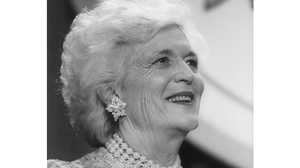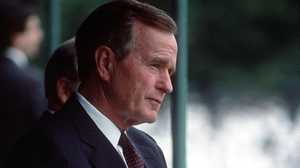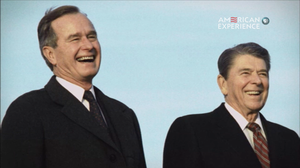Teacher's Guide
Activities
1. What's right vs. what's popular.
After viewing the film, hold a class vote on the following question: How would you rate Bush's willingness to do what he thought was right, even if it wasn't politically popular? Have each student rate Bush on a ten-point scale, with one meaning "He would do anything for political gain" and 10 meaning "He never let politics influence his decisions." Calculate the average rating for the class as a whole.
Then have each student try this interactive exploration of some of Bush's biggest decisions to learn more about the conflicting pressures he faced. When they are done, vote again on the above question. Did the average rating change, and if so, how?
Close by discussing the following question as a class -- Some of Bush's decisions that have been attacked as "political," such as his "no new taxes" pledge during the 1988 campaign, occurred before he was elected President -- some of Bush's decisions that have been praised as courageous, such as breaking that pledge, occurred after he became President. Do you think Bush operated under different moral standards when he was president than when he was a candidate? If so, do you think this was the right thing to do?
2. Different campaigns, different lessons.
The 1988 and 1992 elections differed not only in their outcomes -- Bush won the first but lost the second -- but in their lessons for future presidential candidates. Imagine that you are a strategist for one of the 2008 presidential campaigns and the candidate has asked you for a brief (500 word) memo summarizing lessons from the 1988 and 1992 races that are relevant to 2008.
For example, what issues were important with voters in those earlier races and are also important today? What campaign tactics proved effective (or ineffective) back then, and would they work in today's political climate?
Have each student select a 2008 candidate and write him or her a memo. Organize the memos by candidate and then divide the class into three groups -- one each for Senators Clinton, McCain, and Obama -- and have each group read the memos addressed to their assigned candidate. Did each candidate get a range of advice from his or her different strategists, or was the advice consistent? Also, how different was the advice given to the different candidates?
3. The preppy problem.
George H.W. Bush's background and lifestyle were sometimes described as "preppy." To understand what this means, and why it might have mattered, hold a class brainstorm on the term "preppy." For example, what group of people (sometimes also called "WASPs") is sometimes referred to as preppy? Also, what does it mean when certain clothes, sports, or brand names are referred to as preppy? Discuss these questions as a class and use them to write a class definition of "preppy" on the board.
Next, discuss why a public image of "preppiness" might create problems for an American politician -- especially during an era dominated by Ronald Reagan. What kind of a public image do presidential candidates try to present, and how might preppiness conflict with this image? Do you think Bush succeeded as well as other politicians at projecting the "proper" image?
4. Bush family values.
George H.W. Bush came from a close-knit family that had strong beliefs about public service and private conduct. Did he live up to these values at key points in his life -- and did that help him make wise decisions? Review a timeline of Bush's life and select five events in which you think Bush's actions either did or did not reflect his family's values. Write a brief explanation of each of your choices. Also briefly explain whether you think Bush made the right decision in each case.
Compare your results with those of your classmates -- if any important events in Bush's life were not examined by any student, discuss and evaluate them as a class. Then use this information to recreate the above timeline on the board, listing key decisions in Bush's life and the class's evaluation of them. When did his family's values help, or hurt, Bush in his public career?
5. Reconsidering the Gulf War.
Events since the United States' 2003 invasion of Iraq have caused many people to reconsider their views of the Gulf War, especially George H.W. Bush's decision not to overthrow Saddam Hussein.
To explore this issue, begin by reviewing the basic facts about the two wars as a class. Create a chart on the board that provides the following information about the Gulf War and the Iraq War: (a) when it started, (b) the events that helped cause it, (c) the United States' stated goals in the war, and (d) the outcome.
Next, working with a partner, explore one of the following online reports on the Gulf War, which were produced before the Iraq War: the FRONTLINE special The Gulf War or the CNN special The Unfinished War. Focus on the discussions among policymakers, analysts, and others of how the war ended and the war's legacy.
With your partner, select three passages or quotations from the site that you found most interesting in light of what has happened in Iraq since 2003. For example, were opinions expressed there that are supported, or contradicted, by recent events? Copy down those three passages, and below each, briefly explain why you think it is significant.
Suggestions
1. To launch the activity, you might read students the famous remark by Henry Clay, a powerful member of Congress in the early and mid-1800s and an unsuccessful candidate for the presidency, that he "would rather be right than be President." Do you think people must choose between the two?
2. You might encourage students to write their memos in ways that would make it easy for the candidate (who presumably is very busy) to get the main points easily. For example, students should make use of boldfaced type, headings, and bullets to get their main points across.
3. You might ask students for examples from the current presidential campaign of candidates' efforts to present the kind of public image they think voters will favor.
4. Students may also want to review brief summaries of Bush's policies as president in the areas of domestic affairs and the Gulf War.
5. For information on the Iraq War, students may want to consult the FRONTLINE documentary Bush's War.
Comprehension
For each of the numbered items below, write the letter of the person or place in column two that matches the description in column one. (You will not use all of the items in column two.)
You may first wish to view the film.
People
| 1. Leader of the Soviet Union during Bush's presidency 2. Woman Bush married in 1945 3. Secretary of State during the Bush administration 4. British prime minister who backed the United States in the Gulf War 5. Dictator against whom Bush went to war in 1991 6. Bush's father 7. Presidential nominee who chose Bush as his 1988 running mate 8. Bush's eldest son 9. Man who appointed Bush chairman of the Republican National Committee in 1973 10. Bush's campaign manager in his successful 1980 presidential race |
a. Lee Atwater b. James Baker c. George W. Bush d. Jeb Bush e. Prescott Bush f. Barry Goldwater g. Mikhail Gorbachev h. Saddam Hussein i. Richard Nixon j. Manuel Noriega k. Barbara Pierce l. Ronald Reagan m. Margaret Thatcher n. Clarence Thomas o. Boris Yeltsin |
Places
| 1. Country the United States invaded in 1989 2. State where Bush grew up 3. Country reunified after several decades during Bush's presidency 4. State where Bush moved after World War II 5. Country whose occupation by a powerful neighbor led to the Gulf War 6. Country in which the United States illegally backed guerrillas during Reagan's presidency 7. State where Bush regularly vacationed 8. Country against which the United States went to war in 1991 9. State where Reagan's primary victory over Bush helped bring him the 1980 nomination 10. Cold War adversary of the United States that dissolved during Bush's presidency |
a. Connecticut b. Germany c. Iowa d. Iran e. Iraq f. Korea g. Kuwait h. Maine i. Massachusetts j. New Hampshire k. Nicaragua l. Panama m. Russia n. Soviet Union o. Texas |








